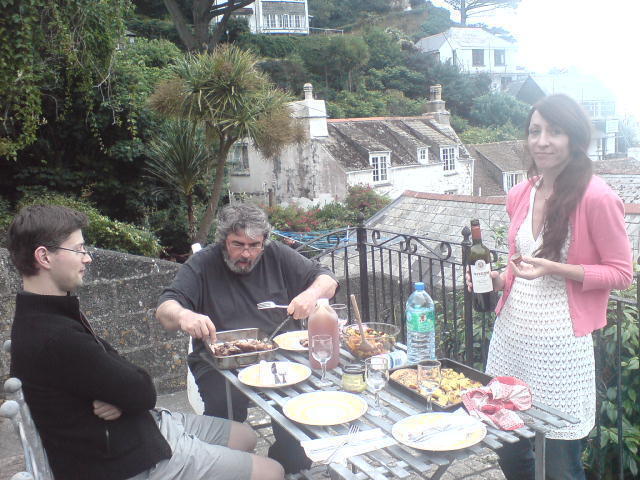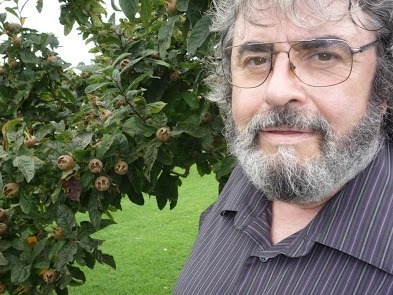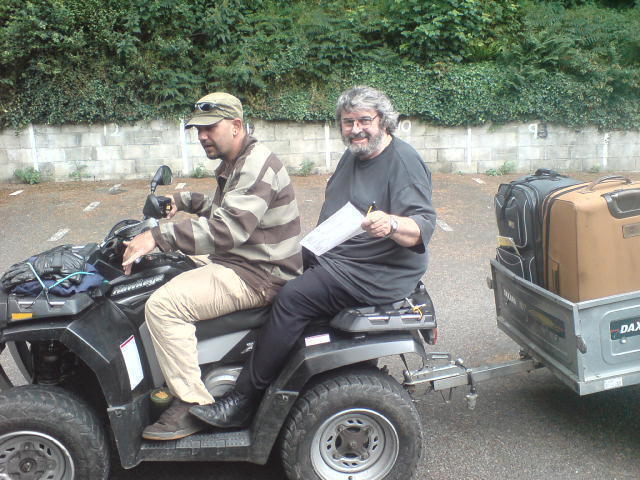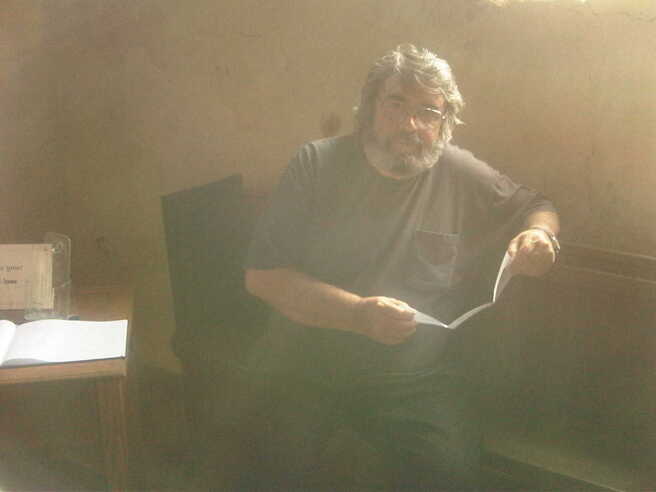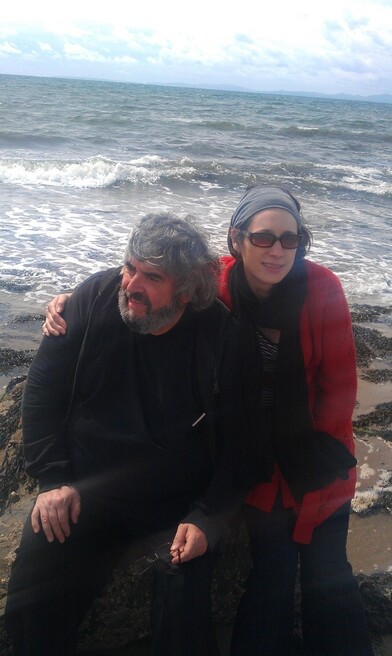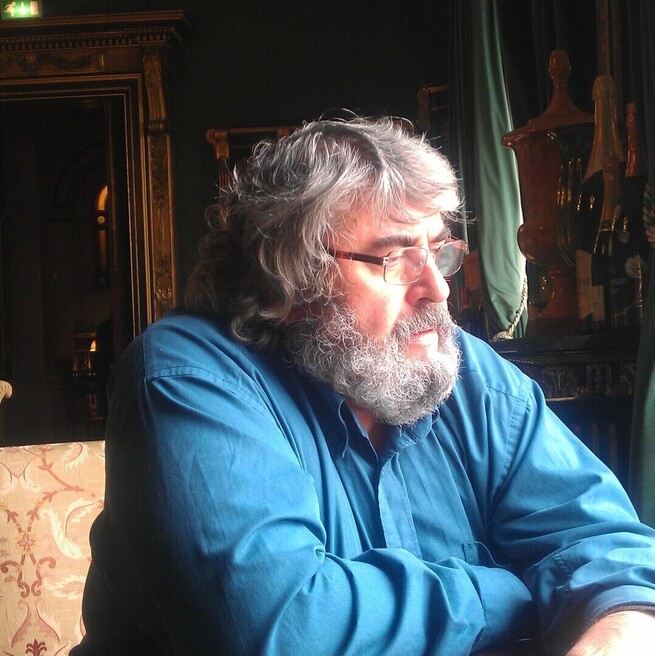Eulogy, delivered at Trinity College Chapel, January 12, 2013
I would like to thank Shaun for asking me to speak today; to do so is a very profound honour -- not only because it gives me the chance to describe what David Llewellyn meant to me, as a friend, but also because I suspect that all of us here came to know something very similar in David, something quite awe inspiring about him, and yet also so very human. And to be given this opportunity, this responsibility -- to name this thing, to name this David that we all knew and loved -- is an honour. A privilege.
I have to confess that the prospect of speaking about David, of his death, and of his life, terrifies me. I have not known many people as deeply educated, and with as real an appreciation of the history of art, of literature, of culture, of politics, of so many things, as David. When I first contemplated speaking in remembrance of David (on such an occasion as this, and in as dignified and hallowed a setting as this, in the company of what I knew would be many people who loved to learn, and in the company of many who have had their own knowledge and learning truly enriched by David’s mind and wit), when I imagined all of this, I wondered how I could possibly do the man justice, how I could possibly hope to cover anything but the tiniest sliver of the influence he had most certainly on all of us. My mind immediately raced over all of the possible ways I might try to capture and represent all of the teaching David had provided. I imagined all of the passages in literature and philosophy that David would have reliably committed to memory which could so completely explain, in the words of our greatest sages and bards, what death truly is. I imagined all of the various depictions on canvas, in frescoes, or sculpted into marble, that David would have been readily able to tell us about, in his completely genuine and uncondescending manner, which would help us to understand the fullest visions of bereavement offered by the world’s greatest masters. I imagined all of the swelling or subtle strains of music – classical or contemporary – that David could have described, whose subject was loss, or mourning, or death itself, with little tidbits of biographical information about the composers in question, or perhaps some curious historical notes about each piece’s performance history. I imagined taking the best of these, and laying them before you as an homage to a friend who was, for me, like a never ending and thoroughly wonderful class: a perpetual seminar, an enduring trip to an infinite library, overseen by a trusted guide, whose open love of life, and genuine good humour made every lesson feel more like a cruise or a holiday, than a museum or gallery.
But then I realized that I was imagining something that was impossible. I was trying to envision delivering a eulogy about David’s expansive erudition, while depending on him, on David, to sketch in all the necessary, and most significant points (which was ridiculous, of course, though entirely revealing of what he was for me, and I suspect for so many of us). There was no way I could ever hope to mimic or match such a thing as David’s intellect, or even his simple interest, and joy, in the record of what our culture has thought and recorded. Indeed, I wasn’t even imagining delivering a eulogy which needed David; I was imagining David delivering his own eulogy, or a treatise on the history of death in art, or on the history of eulogies in all their artistic forms, with me as a greedy audience, thankful he was doing the job for me.
So what am I to say, now? ...now that it is obvious that I was dependent on him... that we owe David, even now, today, outrageously, at his own funeral? Am I to say “Thank you”? Is that sufficient? I can hear him chuckling, now, like some benevolent uncle, and providing a citation that would capture this irony.
The truth is, I don’t dare to offer some pithy reference or allusion -- out of respect for David, and in open recognition that, in my relationship with him, he was the master, and I the student. I also will not offer any quotation, or extract, for I know that not to do so will keep us searching for the echo of David’s voice in the art and literature that we have yet to encounter, or that we will experience again, and that this would make him happy: to know that we still want to learn, and read, and see, and listen, and discover. And I will look for this echo of David in the learning that I have yet to do, and I promise his spirit that I will not fail to remember the greatest lesson that he gave -- that I will delight in the best, and funniest, and deepest, and most sincere, the most human, most troubled, and most ecstatic expressions of the human soul and heart. For I believe this is what David Llewellyn has taught us to do, and I think we owe it to him, to hear him, and to know him again, continuously, in this fashion.
But I also want to remember David in detail, in the past, in the concrete. So instead of a passage, or an allusion, I will tell a story: an anecdote of how David helped me. I have many such stories, but this one will have to suffice, and I trust you all will see in it what David was for you.
I have often had, through the years, the fortune to share a preparation period with David at Central Technical School. Sometimes, this was an infuriating prospect, as I would try to accomplish some hurried piece of busy-ness at one computer terminal, frantic, while David would sit beside me at another, whistling along to some unconscionably loud piece of jazz or classical music playing on his computer, entirely at ease, perhaps maintaining or editing his own personal variorum edition of some Shakespearean quarto (and yes, David did actually do such things, and what’s more, even introduce such work here and there to classes at Central Tech), or perhaps he might be amending one of his meticulously constructed “study guides” for a core text in one of his classes. Either way, slowly, but surely, David would inevitably drag me into his world, from mine, and before I knew it, the learning would begin, even if at first I was secretly petulant and resisting. As we all know, David measured time in centuries, or even millennia (except when it came to his own meals, and other physiological needs). He lived in a world of long epochs and eras, and he had very little patience for any endeavour whose philosophical underpinnings had roots measurable in mere years, or simple decades. And alas, many of the busiest, and most frantic tasks we undertake in the education business have just these sorts of shallow historical roots. So he never felt bad about distracting me, as it was always for a noble purpose.
But to the point. I am not sure how David brought me there, but we did end up talking about music, and film, as I recall. Perhaps what he was listening to reminded me of something; I don’t know. I mentioned a film which contained in its score a classical piece that I deeply enjoyed, but whose title and composer I did not know. When I tried more or less unsuccessfully to hum it, and then mentioned the film, David of course knew it, and told me, “That’s Samuel Barber’s Adagio for Strings.” He then told me it was a modern piece: twentieth century, in fact. He gave me a little detail about Barber’s life, described the Adagio as a kind of “neo-Baroque”, and then sensing, I think, that I needed some help understanding the original, “old” Baroque, filled me in there as well. At no point in all of this was David either condescending or pontifical. Indeed, it was his own genuine passion for what he was discussing that completely had me forget myself, and my pride, as all that he offered sank in. I knew David had an astonishingly extensive library of compact discs, and I asked him if he had a copy of Barber’s Adagio. He brought me a CD the next day, with Barber’s String Quartet in B minor, of which the Adagio, I then discovered, was merely a part.
But that’s not the end of the story. A couple of days later he asked if I was done with his CD. I assumed he was impatient for its return, and bumbled through a promise for its speedy delivery, as David was not afraid to snap at me when I (or the world generally) tested his patience (I had indeed grown accustomed to this impatience, especially when David struggled with uncooperative computers in the office). But I was wrong. He actually had more CDs for me: the original Baroque, the stuff I was most embarrassed not to know: Arcangelo Corelli, some Albinoni too, and others. He made no comment at this point, offered no lecture, no study guide -- just the stack of CDs. We in fact had another discussion, much later, in which I mentioned something I’d heard on the radio, a piece by Henry Purcell, an English composer. David told me then that Purcell was an example of English Baroque, and I quietly nodded my head, as to thank him at such a time would have been an insult to David’s true and humble dignity, and would have embarrassed him.
I think that the lesson about Samuel Barber may have been as much as four, or five years ago. I have been waiting all this time, waiting to show the world how David helped to make me more of an educated person, a person less afraid, a person more confident around those with more knowledge than me about… the Baroque. To show that I, too, now know a little something about… the Baroque! If only a little something.
And now I have had that chance. And more, much more: now I believe that if one of my students asked me, “Sir, what’s Baroque?”, I think I could help them, and show them -- without looking it up, in a rush, and without doing myself, or the student, or the idea itself, any dishonour.
Thank you, David...
Thank you, teacher…
Thanks, sir.


